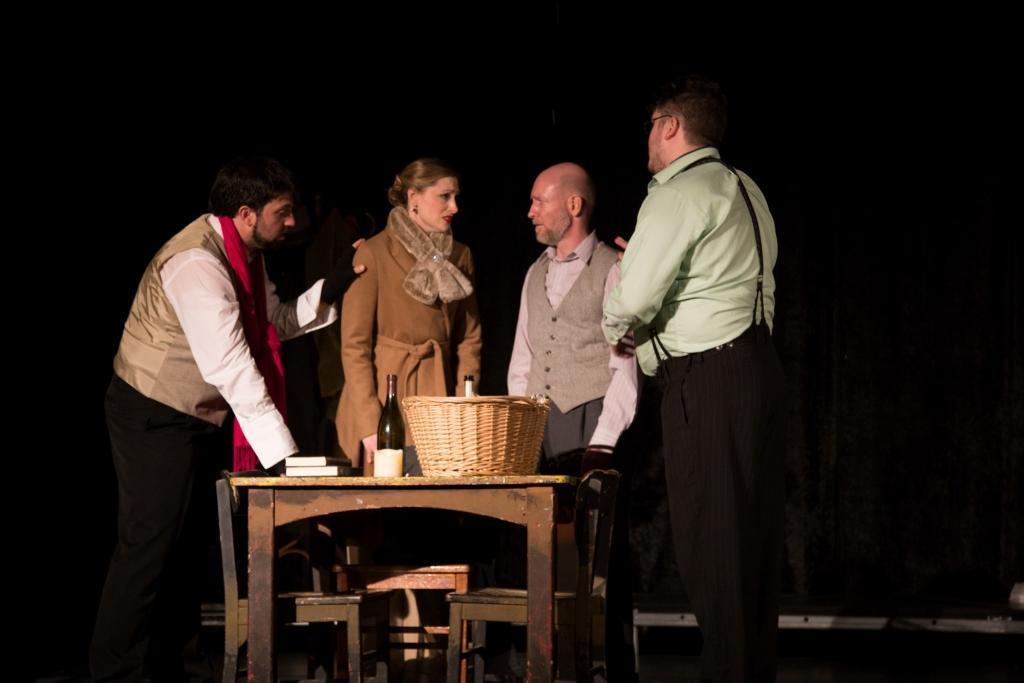 Reviewed by Barry Lenny, Saturday 9th December 2017.
Reviewed by Barry Lenny, Saturday 9th December 2017.
Co-Opera's Intermezzo Series ends 2017 with a production of Puccini's
La Bohème, originally set in Paris's Latin Quarter in 1840 and brought into the 1940s in this version. The Intermezzo Series is specifically designed to allow young and emerging artists the opportunity to sing major roles to help them progress their careers. The work was conducted by Brian Chatterton OAM and directed by, now Adelaide based Italian baritone, Mario Bellanova.
Bellanova bought his vast knowledge and experience as an international performer to bear on the production, and his influence was unmistakable in every aspect of the work. Every singer presents a believable, three-dimensional character, and convincing interpersonal relationships are developed, with emotions extending beyond the vocal into facial expressions and body language. This is the modern face of opera, a far cry from walking out, singing straight at the audience, and bowing to the applause. Overblown opera of the past has been replaced by strongly theatrical work, drawing the audience into the drama. Chatterton brought forth all of the beauty and expression in Puccini's score, the orchestra, soloists, and chorus at one with his vision.
Co-Opera performances are generally sung in English but, on this occasion, it was in Italian, with English surtitles projected onto a screen beside the stage. This production toured to a number of venues, some in conventional theatre format but,
A. Hart's Mill, their normal cabaret format prevailed and audiences took full advantage of the opportunity to take food and drinks.
Four bohemian friends share a cold garret: the poet Rodolfo, tenor, Branko Lovrinov, the painter, Marcello, baritone, Daniel Smerdon, the musician, Schaunard, baritone, James Moffatt, and the philosopher, Colline, bass, Daniel Goodburn. The story focuses primarily, though, on two of them, Rodolfo and Marcello, and their romantic involvements with Mimi, soprano, Grace Bawden, and Musetta, soprano, Alexandra Scott, respectively.
Benoît, their landlord, and Alcindoro, a wealthy state councillor, are both sung by bass, Peter Deane. With only a small stage, the large crowd scenes are left to the imaginations of the audience, with the chorus seated next to the small orchestra, although the five-member children's chorus does appear onstage, gathering around the toy seller, Parpignol, tenor, Graham Loveday, and also playing the soldiers. Bass, Duncan Vecchiorelli, sings the role of the customs sergeant at the toll gate at the Barrière d'Enfer at the start of act 3.
On the one hand, there is the tragic love affair between the consumptive seamstress, Mimi, and the poet, Rodolfo. Branko Lovrinov and Grace Bawden give wonderful performances, from the tenderness of that first meeting, when they fall in love at first sight, to his giving her up to allow her to be with a rich man who would take care of her, through to her return and death from tuberculosis and his breakdown over her body. These two generated powerful emotions and offered very moving performances, complementing each other superbly.
Bawden brings a level of fragility to the role that is often missing, which endears Mimi to us as Bawden progressively worsens her character's illness. Lovrinov responds with warmth and believable concern for Mimi, his anguish at separating from her for what he sees as her own good is clearly articulated. They make an ideal pairing, their voices blending superbly.
Musetta is Marcello's ex-lover, now involved with Alcindoro, but she has tired of him and is eager to win back Marcello's love. Theirs is a tempestuous relationship, as she likes to flirt and he is a jealous man. Daniel Smerdon and Alexandra Scott find the comedy that counters the sadness of Mimi and Rodolfo's doomed romance.
Scott is sensational as Puccini's "good time girl", flamboyant, bright, and effervescent, caring nothing for what other people think. Her energetic performance is contrasted, later, by her sensitive approach to Mimi's illness and death. Smerdon gives a strong performance as Marcello, creating a character who, while defiantly insisting that he is disinterested in her and her fun-loving ways, allows us to see his true feelings. Smerdon's well-balanced interpretation and Scott's equally multidimensional characterisation make for a captivating series of encounters as their relationship develops.
The other two main characters, Schaunard and Colline, are also given believable three-dimensional characterisations by James Moffatt and Daniel Goodburn, adding greatly to the strength of this production
Watch out for the Intermezzo Series next year, as well as all of Co-Opera's touring productions, and you'll be assured of a great night out and, as they have a regular audience of enthusiasts, you'll be in good company.
Reader Reviews
To post a comment, you must
register and
login.
 Reviewed by Barry Lenny, Saturday 9th December 2017.
Reviewed by Barry Lenny, Saturday 9th December 2017. Reviewed by Barry Lenny, Saturday 9th December 2017.
Reviewed by Barry Lenny, Saturday 9th December 2017.